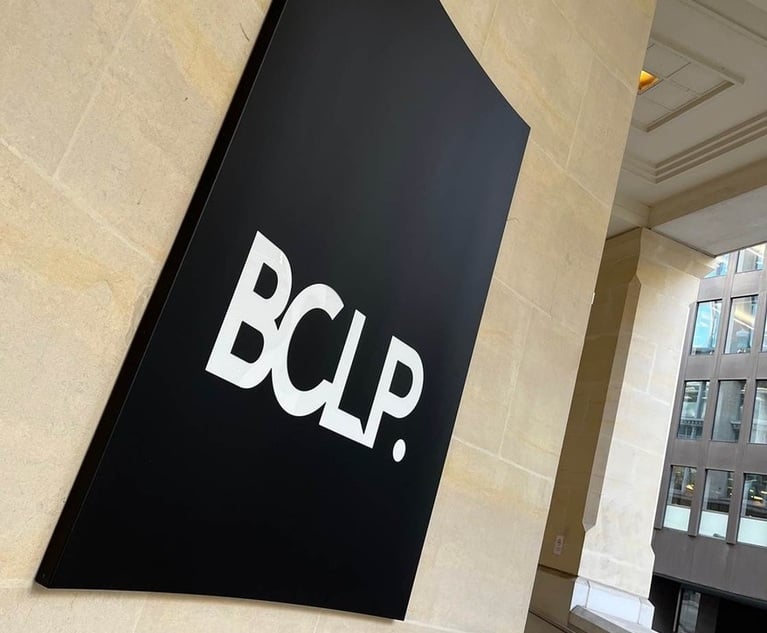Is Linklaters' China alliance a game changer?
The magic circle firm's Shanghai Free Trade Zone joint operation wasn't the first, but it might just be the tipping point
May 29, 2018 at 02:06 PM
6 minute read
The original version of this story was published on Law.com
 The Shanghai Free Trade Zone
The Shanghai Free Trade Zone
Linklaters announced last week that its unusual application for a joint operation office in the Shanghai Free Trade Zone had finally received approval from the local authorities, making it the first magic circle firm that can include Chinese law capability in a one-stop-shop offering.
"Linklaters' successful joint operations application sends a very positive message to the market," says Shawn Chen, who leads the China business for London-based SSQ, a legal search firm that helps global firms broker China alliances. "This will give confidence to firms that are preparing an application and those considering applying."
Foreign law firms were for years barred from forming formal associations with Chinese law firms, which have enjoyed the exclusive right to give Chinese legal opinions and appear at local courts. However, a major breakthrough came in 2014 when the Ministry of Justice approved a pilot program that permitted foreign and Chinese firms to form joint operations in the then-brand-new Shanghai Free Trade Zone. In March, the Shanghai government said it plans to expand the pilot program beyond the FTZ—to the entire municipality.
From the Chinese government's perspective, the purpose of the Shanghai FTZ programme is to create a platform for international law firms to share their experiences and help their Chinese partner firms improve. But the programme also effectively serves as an official endorsement, granting foreign law firms access to their major missing piece—Chinese law capability.
Linklaters was not the first firm to benefit from the FTZ program; four other global firms—Baker McKenzie, Hogan Lovells, Holman Fenwick Willan, and Ashurst—have entered similar joint operation arrangements since 2015.
But the formation of Linklaters' alliance was unique. Instead of linking up to an established firm, Linklaters opted to send a group of its own lawyers to a lesser-known Shanghai-based boutique called Zhao Sheng Law Firm, making it the first global firm to successfully achieve a modified spin-off structure under the FTZ program.
In contrast, Baker McKenzie, the first global firm to launch a joint office in the FTZ, formed an alliance with the well-established, Beijing-based FenXun Partners. It was followed by Hogan Lovells, Holman Fenwick Willan, and Ashurst, all of which also formed tie-ups with existing Chinese firms. Ashurst's move was particularly notable, as it formalized a longtime best friend relationship with 750-lawyer domestic player Guantao Law Firm.
But Linklaters ostensibly spun off a local firm with which it would form an alliance—an unusual move that many consider significant.
Eric Liu, managing partner of the now 27-lawyer Zhao Sheng and a former Linklaters lawyer, said the alliance with Linklaters provides clients with seamless one-stop-shop service and minimises possible friction arising from working with two sets of counsel.
China's legal market is not mature enough to separate top-tier firms from the rest of the crowd, Liu said. In Shanghai, alone, there are more than 1,500 domestic firms, and there are many foreign firms on top of that. "The market can't really tell who's who," Liu said. "You are often pitching against firms that have never been your competitors elsewhere, and they offer one-fifth your price."
If a law firm wants to be competitive, it has to offer good value for its clients' money, he said. "For us, providing seamless high-quality Chinese and foreign law services is that value."
Of course, many global firms have long recognised the importance of having access to a Chinese law practice. But the challenge for them has been to find the right Chinese firm to partner with. In 2015, Linklaters tried to form an association with existing Chinese firms, according to Legal Week, The American Lawyer's London-based sibling publication.
But those talks failed to produce an agreement. The firm's partnership then decided to pursue a so-called "greenfield" option, under which the firm would send out a group of its own lawyers and launch a separate Chinese law firm with the goal of later entering into an FTZ association. As the rules required the Chinese firm participating in the FTZ scheme to be at least three years old, Linklaters opted for Zhao Sheng, a local firm that was founded in 2010, and eventually launched the joint operations.
Zhao Sheng and Linklaters were aligned in every critical aspect, including firm culture, practice focus, and client service standards, said William Liu, (no relation to Eric Liu), who leads the U.K. firm's China practice from Hong Kong. "This is the only way to ensure that we can provide a fully seamless service to clients."
According to official records, Zhao Sheng moved in September of last year into Linklaters' Shanghai office at the Mirae Asset Tower, in the Lujiazui financial district. William Liu said the two firms also share office systems and would further integrate.
A Shanghai-based partner from another Magic Circle firm agreed it makes sense for international firms to be able to access Chinese law capability in certain practices. "It's very beneficial, especially for litigation matters," said the partner, who did not wish to be named as he was not authorized to comment on his firm's position on the issue.
Both firms stressed that Zhao Sheng would remain independent from Linklaters; Eric Liu said in addition to ex-Linklaters lawyers, Zhao Sheng has made several important external hires over the past year from leading Chinese firms. He hopes that the alliance will help increase Zhao Sheng's brand profile in the mainland legal market and give both firms a competitive advantage.
But if Eric Liu's predictions are correct, the Linklaters-Zhao Sheng joint operation won't enjoy that competitive advantage indefinitely. Eric Liu believes that once the firms' joint operation proves successful, more firms will consider this model. And when the number of Chinese-foreign joint offices reaches a critical mass, the competitive landscape in the market will change, he said.
Chen, from SSQ, believes that it is noteworthy in and of itself that Linklaters' unusual business model got the long-sought-after green light from Chinese regulators. And he believes more global firms will now follow suit. More firms will likely file applications for FTZ joint operations in the second half of this year, he said.
"The question that everybody had in mind was whether or not this model was actually feasible; now we know that it is," he said. "I won't be surprised if by next year there are 10 firms operating joint offices in the FTZ."
This content has been archived. It is available through our partners, LexisNexis® and Bloomberg Law.
To view this content, please continue to their sites.
Not a Lexis Subscriber?
Subscribe Now
Not a Bloomberg Law Subscriber?
Subscribe Now
NOT FOR REPRINT
© 2025 ALM Global, LLC, All Rights Reserved. Request academic re-use from www.copyright.com. All other uses, submit a request to [email protected]. For more information visit Asset & Logo Licensing.
You Might Like
View All
Jones Day Names New Practice Leaders in Brussels, Latin America and the US

Lawyers React To India’s 2025 Budget, Welcome Investment And Tax Reform

BCLP Joins Crowded Saudi Legal Market with Plans to Open Two Offices
3 minute readTrending Stories
- 1Parties’ Reservation of Rights Defeats Attempt to Enforce Settlement in Principle
- 2ACC CLO Survey Waves Warning Flags for Boards
- 3States Accuse Trump of Thwarting Court's Funding Restoration Order
- 4Microsoft Becomes Latest Tech Company to Face Claims of Stealing Marketing Commissions From Influencers
- 5Coral Gables Attorney Busted for Stalking Lawyer
Who Got The Work
J. Brugh Lower of Gibbons has entered an appearance for industrial equipment supplier Devco Corporation in a pending trademark infringement lawsuit. The suit, accusing the defendant of selling knock-off Graco products, was filed Dec. 18 in New Jersey District Court by Rivkin Radler on behalf of Graco Inc. and Graco Minnesota. The case, assigned to U.S. District Judge Zahid N. Quraishi, is 3:24-cv-11294, Graco Inc. et al v. Devco Corporation.
Who Got The Work
Rebecca Maller-Stein and Kent A. Yalowitz of Arnold & Porter Kaye Scholer have entered their appearances for Hanaco Venture Capital and its executives, Lior Prosor and David Frankel, in a pending securities lawsuit. The action, filed on Dec. 24 in New York Southern District Court by Zell, Aron & Co. on behalf of Goldeneye Advisors, accuses the defendants of negligently and fraudulently managing the plaintiff's $1 million investment. The case, assigned to U.S. District Judge Vernon S. Broderick, is 1:24-cv-09918, Goldeneye Advisors, LLC v. Hanaco Venture Capital, Ltd. et al.
Who Got The Work
Attorneys from A&O Shearman has stepped in as defense counsel for Toronto-Dominion Bank and other defendants in a pending securities class action. The suit, filed Dec. 11 in New York Southern District Court by Bleichmar Fonti & Auld, accuses the defendants of concealing the bank's 'pervasive' deficiencies in regards to its compliance with the Bank Secrecy Act and the quality of its anti-money laundering controls. The case, assigned to U.S. District Judge Arun Subramanian, is 1:24-cv-09445, Gonzalez v. The Toronto-Dominion Bank et al.
Who Got The Work
Crown Castle International, a Pennsylvania company providing shared communications infrastructure, has turned to Luke D. Wolf of Gordon Rees Scully Mansukhani to fend off a pending breach-of-contract lawsuit. The court action, filed Nov. 25 in Michigan Eastern District Court by Hooper Hathaway PC on behalf of The Town Residences LLC, accuses Crown Castle of failing to transfer approximately $30,000 in utility payments from T-Mobile in breach of a roof-top lease and assignment agreement. The case, assigned to U.S. District Judge Susan K. Declercq, is 2:24-cv-13131, The Town Residences LLC v. T-Mobile US, Inc. et al.
Who Got The Work
Wilfred P. Coronato and Daniel M. Schwartz of McCarter & English have stepped in as defense counsel to Electrolux Home Products Inc. in a pending product liability lawsuit. The court action, filed Nov. 26 in New York Eastern District Court by Poulos Lopiccolo PC and Nagel Rice LLP on behalf of David Stern, alleges that the defendant's refrigerators’ drawers and shelving repeatedly break and fall apart within months after purchase. The case, assigned to U.S. District Judge Joan M. Azrack, is 2:24-cv-08204, Stern v. Electrolux Home Products, Inc.
Featured Firms
Law Offices of Gary Martin Hays & Associates, P.C.
(470) 294-1674
Law Offices of Mark E. Salomone
(857) 444-6468
Smith & Hassler
(713) 739-1250









